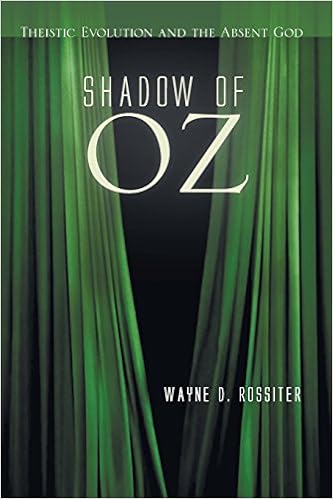 From Waynesburg University (Pennsylvania) biology prof Wayne Rossiter, author of In the Shadow of Oz, on new atheist neuroscientist Sam Harris’s Spirituality without Religion:
From Waynesburg University (Pennsylvania) biology prof Wayne Rossiter, author of In the Shadow of Oz, on new atheist neuroscientist Sam Harris’s Spirituality without Religion:
There’s no “I” in “Me” (and no sense in Sam Harris)
…
As with nearly all of Harris’s work, the book can safely be discarded before exiting the first chapter. In Saganesque fashion (remember Cosmos, “the universe is all that is or was or ever will be”?), Harris gives us, “Our minds are all we have. They are all we have ever had.”(p 2) His main thesis is that the mystics of antiquity were right in denying even this. There is no self, and so there is no mind (quotes to this affect forthcoming). How does Harris know this? Well, it all started when he took drugs as a young boy (namely, MDMA, psychoactive drug). For most sane individuals, this would be a bad start to the story. If one need take a chemical that alters brain behavior in order to see the truth of reality, it would immediately mean that all of those truths you’re seeing while not high are in fact fictions. I suppose it’s well established that the folks using MDMA at rave parties are seeing reality quite clearly. Isn’t that where the last Nobel Prize-winning idea emerged? No? Well, perhaps the breeding grounds for numerous studies in the psychologically self-destructive tendencies of America’s youth.
Anyway, following Harris’s “I love you man” moment, he realized that boundless love is the base level of reality. Somewhere in his exit from that drug-induced state, he seems to have confused loving for loathing: a feeling he feeling he expresses towards many groups (Christians in particular). I’ll let pass his conflation of “spiritual” with “religious,” because it’s a moot point. What does “spiritual” mean if not feeling something transcendent to material reality?

…
Sounding like a pious monk, rather than a rational materialist (which he claims to be), Harris goes further down the wormhole, writing, “A true practitioner is someone who has discovered that it is possible to be at ease in the world for no reason.” (p 17) Belief without reason is supposed to be anathema to Harris. Apparently he’s practicing the “dissolve yourself as I say, not as I do” line of logic. To his credit (and at the expense of his entire thesis…which is typical form for Harris), he writes, … More.
We figured new atheism would end up this way, and the main question is how much damage it will do to non-new atheists in the meantime.
The old atheists make a lot more sense. It’s not clear what the new atheists’ interest in science is all about, if Harris’s view is typical.
See also: Are these atheists and agnostics really covert creationists? “With Nagel’s book coming out, and reading of his continued openness towards ID, it caused me to reflect more upon the increasing number of atheists and agnostics who are coming out and critiquing Darwinism and/or supporting ID.” (Joshua Gidney)
Follow UD News at Twitter!